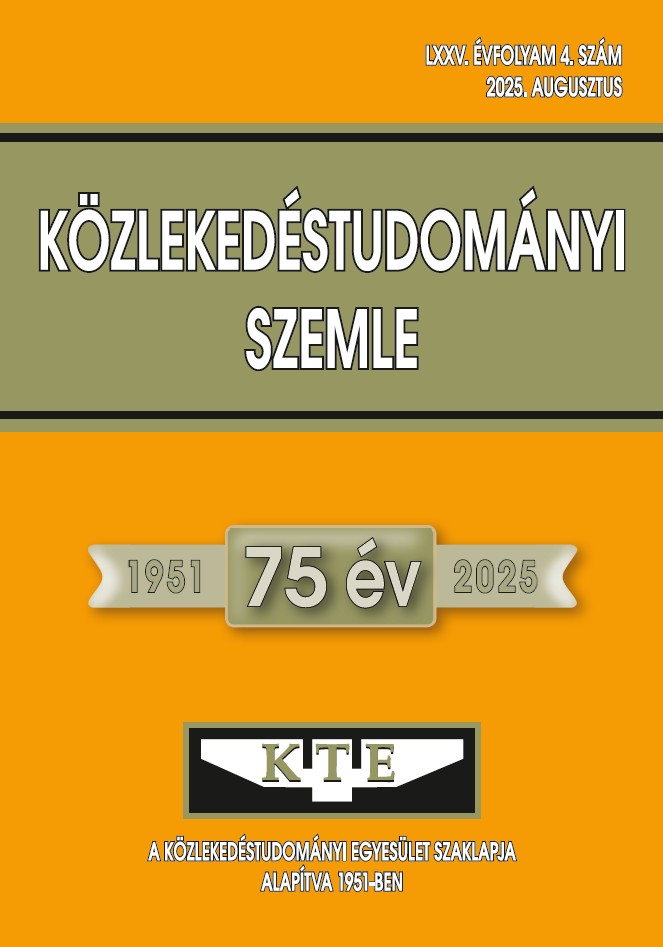The Role of Generations in Rail Transport and Maintenance, in the Light of Ongoing Developments in Infrastructure and Equipment
Abstract
Economic developments in Europe, the associated increase in demand for mobility and the achievement of climate policy objectives are all impossible without a transformation of rail transport. This transformation cannot be achieved without widespread digitalisation and automation in the rail sector. At the same time, the current labour market situation and the need to replace an ageing and shrinking workforce are key issues that all railway companies must address. This article presents the results of a generational study that identified the characteristics and preferences of the workforce. This information can be used to develop strategies that will make railway companies’ workplaces more attractive. The research focused on data-based
statements about the population of Hungary, with the expected changes in the labour market there forming the starting point. That was followed by the examination of the impact of ongoing and anticipated rail network developments, digitalisation and automation. The results of this will provide a guidance about
the number of employees required following these changes. This highlights areas where the change should result in the acquisition of new competences for employees who continue to work for the company.
References
Bakewell, C., Mitchell, V--W. (2003), „Generation Y female consumer decision-making styles”, International Journal of Retail and Distribution Management. 31, p.95-106
Csehné Papp. I. (2017): A Z generáció munkához való viszonya. In: Mészáros A., Lestyán K. (szerk.) Generációso(k)k – Tanulmányok a generációk témakörében Gödöllő: Szent István Egyetemi Kiadó. 124-139.
Deal, Jennifer J.- Levenson, Alec (2016): Generational Conflict at Work
Eckhart Voss (2022): Foglalkoztathatóság a vasúti ágazatban a digitalizálás és az automatizálás fényében. CER, ETF EDA Rail projekt összefoglaló jelentés. 2022. augusztus
Howe, N. & Strauss, W. (1991): Millennials Rising: The Next Great Generation. NewYork,
Kiss Imola (2019): Generációk az újkorban, Budapest
Kupperchmidts, B. R. (2000): Multingenerational employees: strategies for effective management. The Health Care Manager
Mannheim K. (1969): A nemzedéki probléma. In Huszár T. – Sükösd M. (szerk.): Ifjúságszociológia. Budapest: Közgazdasági és Jogi Könyvkiadó,
McCrindle, M., Wolfinger, E. (2009). The ABC of XYZ. Understanding the Global Generations. Sydney: University of New South Wales Press.
Nemes Orsolya (2019): Generációs mítoszok, HVG Kiadó, Budapest
Strauss, W., Howe, N. (1991). Generations: The History of America’s Future, 1584 to 2069. New York: Harper Perennial, William Morrow and Company
Schuman, H. – Scott, J. (1989): Generations and collective memories. American Sociological Review, old. 359-381.
Szabó-Szentgróti Gábor – Gelencsér Martin – Szabó-Szentgróti Eszter – Berke Szilárd (2019): Generációs hatás a munkahelyi konfliktusokban Vezetéstudomány / Budapest Management Review 50(4):77-86. DOI: https://doi.org/10.14267/VEZTUD.2019.04.08
Zeffane, R. (2022): Human Resource Management: People and Organizations. Cambridge University Press.
Zombainé Tarnótzky Krisztina (2015): Generációk összehasonlítása, különös tekintettel a Z generáció és tanáraik között fellelhető különbségekre, Budapesti Gazdasági Főiskola Kereskedelmi, Vendéglátóipari és Idegenforgalmi Kar, old. 12–18.
Copyright (c) 2025 Scientific Review of Transport

This work is licensed under a Creative Commons Attribution-NonCommercial-NoDerivatives 4.0 International License.
Articles published electronically are open access (OJS), freely available online and can be downloaded. Authors of articles are not charged any publication or publishing costs (APC). Users have the right to read, download, copy, print, and search the articles, or share the full text with a link.
Authors must declare that their submission has not been previously published in another journal, that financial support has been acknowledged, and that the list of references is complete and accurate, including specification of URLs and DOIs (if available). When submitting a draft article, each author approves the submitted version. Authors guarantee that the article is their original work. Authors are required to participate in the peer review process, follow the advice of reviewers, meet the prescribed deadlines, and, if any, withdraw the submission or correct errors.
All submitted articles are subject to peer review, where the editors request an independent evaluation from at least one expert, ensuring that the reviewer(s) have no conflicts of interest with the authors. The final decision is made by the Editor-in-Chief, who takes into account the evaluations and the suggestions of the editors. The editors and reviewers treat the submission confidentially.
The publisher and editors are committed to maintaining high ethical standards and to preventing publications that involve research misconduct. They follow the COPE guidelines on such ethical issues.
The authors retain copyright and grant the journal the right of first publication under the Creative Commons License (https://creativecommons.org/licenses/by-nc-nd/4.0), which allows others to share the work, while acknowledging the authorship of the work and the first publication in the journal.
The journal archives all published articles, and the journal's owner, the Hungarian Society of Transportation Sciences, will continue to operate the database even if the journal ceases to be published.















